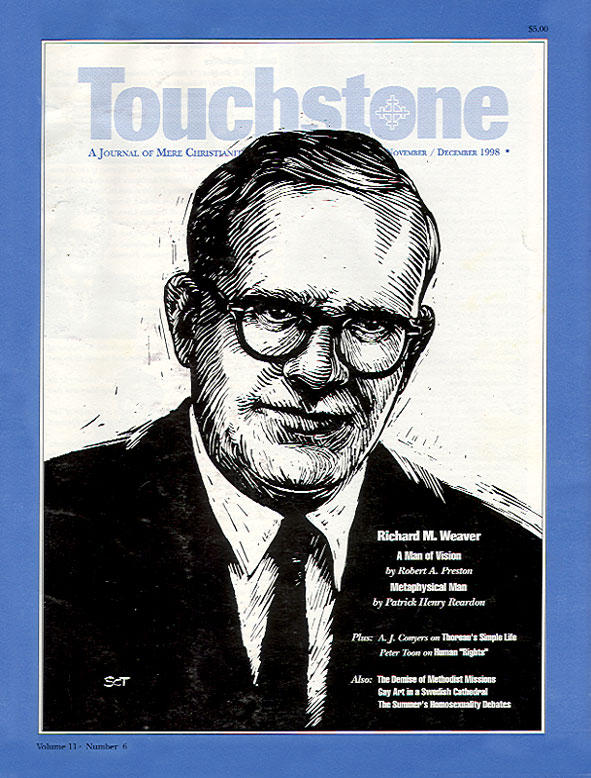Christianity & Subjective Human Rights
On the Fiftieth Anniversary of the United Nations’ Universal Declaration of Human Rights (1948)
by Peter Toon
Far too many people around the world are treated inhumanely and even barbarously. In such contexts the message of the Universal Declaration of Human Rights, issued fifty years ago by the newly formed United Nations, that “all human beings are born free, and equal in dignity and rights” needs to be heard again so that basic human rights—such as full recognition as a person before the law to equality before the law and equal protection of the law—are not only fought for but also implemented.
In contrast, a “human rights industry” has developed in North America on the basis of the post-1960s American judicial rights revolution, and the Universal Declaration is now interpreted as if it were a global Bill of Rights, a list of essentially separate guarantees. The result is an increasing demand for more and varied rights from more and more individuals, organizations, and groups with less and less reference to responsibility, duty, and community.
It seems appropriate on the fiftieth anniversary of the adoption of this Declaration for a Christian pastor and theologian to offer some reflections upon the theme of “rights.”
What Is a “Right”? From Objective to Subjective Rights
The word right is used both in an objective sense (e.g., that which is right, to which I appeal) and in a subjective sense (that which I claim as mine). A right in the subjective sense can be understood as (a) a right I have because I appeal to an objective, transcendent law, and thus a right that flows from that which is outside myself, and (b) a right that I possess individually by reason of its inhering in my humanity—belonging to my personhood and nature and thus possessed by me. Then, in terms of (b) I can either see this inherent right as related to an objective law of nature (God) or not.
“Right(s)” as a legal term has a long history in Roman, medieval, and early modern times pointing to certain possession of specific persons or classes of persons based upon covenants, royal grants, the ancient constitution, or the common law (e.g., the Bill of Rights of 1688 of “the Glorious Revolution” in Britain). However, from the eighteenth century (American and French revolutions), in political, moral, and everyday speech, this noun, usually in the plural and with the adjective “natural,” has referred to a title or claim by an individual human being in his individuality and as a creature possessing dignity. Such subjective rights have been defined as “a certain moral power which every man has, either over his own things or over things due to him”—thus rights to religious liberty and free speech and more.
In his book, Desire of the Nations, Oliver O’Donovan states:
The language of subjective rights (i.e., rights which adhere to a particular subject) has . . . a perfectly appropriate and necessary place within a discourse founded on law. One’s right is the claim on which the law entitles one to demand performance. In such a sense mishpat may sometimes be translated “a right” in the text of the Hebrew Scriptures. What is distinctive about the modern conception of rights, however, is that subjective rights are taken to be original, not derived. The fundamental reality [today] is a plurality of competing, unreconciled rights, and the task of law is to harmonize them. (p. 248)
Thus in the modern sense the “right” is usually a primitive endowment of power with which the subject first engages in society. This contrasts with the older, legal sense of a right as an enhancement which accrues to the subject from an ordered and politically formed society.
subscription options
Order
Print/Online Subscription

Get six issues (one year) of Touchstone PLUS full online access including pdf downloads for only $39.95. That's only $3.34 per month!
Order
Online Only
Subscription

Get a one-year full-access subscription to the Touchstone online archives for only $19.95. That's only $1.66 per month!
bulk subscriptions
Order Touchstone subscriptions in bulk and save $10 per sub! Each subscription includes 6 issues of Touchstone plus full online access to touchstonemag.com—including archives, videos, and pdf downloads of recent issues for only $29.95 each! Great for churches or study groups.
Transactions will be processed on a secure server.
more from the online archives
calling all readers
Please Donate
"There are magazines worth reading but few worth saving . . . Touchstone is just such a magazine."
—Alice von Hildebrand
"Here we do not concede one square millimeter of territory to falsehood, folly, contemporary sentimentality, or fashion. We speak the truth, and let God be our judge. . . . Touchstone is the one committedly Christian conservative journal."
—Anthony Esolen, Touchstone senior editor










